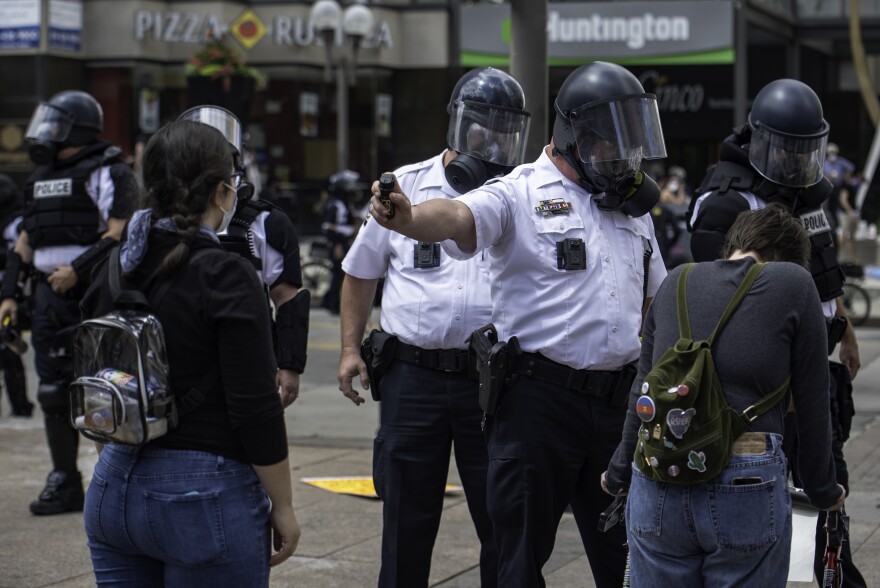Last summer, as protesters demanding racial justice flooded Columbus streets, a meme began passing around social media, depicting the city budget as a bar graph with police spending dwarfing every other expenditure.
The graph was misleading: Big chunks of the budget, like the fire department, were left off. It also didn’t account for education, which has a separate budget.
To protesters who have been chanting "Defund The Police," the central point remains: Columbus, like many cities, devotes about a third of its operating budget to police, and activists say that money might be better spent elsewhere—stabilizing communities to prevent crime, rather than paying for more enforcement.
Now, Columbus City Council president Shannon Hardin says the city is taking a small step in that direction.
This evening, Council members votes on a budget for the coming year, and it carries a controversial amendment proposed by Hardin. If approved, the budget would delay the hiring of new police officers while an audit of department hiring and recruiting practices plays out.
The money saved from that delayed recruitment would go to violence intervention, as well as police training and first aid equipment to implement "Andre’s Law," the measure passed in honor of Andre Hill requiring officers to administer aid and activate body cameras.
“This will add to the momentum for reform and invest in our people and neighborhoods to prevent violent crime,” Hardin explained before the vote on his amendment earlier this month. “A message that we heard loud and clear through our hearings.”

Hardin’s plan would set up a $10 million fund for city efforts to “reimagine public safety.” That’s only about 1% of the overall city budget, but Hardin has a long list of plans for those dollars. The majority, $7.5 million, establishes an alternative response division, expanding on existing units that pair an officer with a social worker, and piloting programs with no police at all.
Other funds go to violence intervention through employment, youth outreach and domestic violence prevention. Still more money pays for new first aid equipment and training for current officers.
The problem is where Hardin found the money.
“In November of 2020, Council voted to hire an independent professional to audit the recruitment and hiring practices for the Division of Police," Hardin said. "I believe that we should wait until this audit is complete to hire additional officers.”
According to department records obtained by WOSU, Columbus Police has hired at most seven Black officers per police class since 2010, and officers have alleged patterns of racism and discrimination within the department.
Under the mayor’s proposed budget, the division would hire two classes of recruits—one in June and the other in December. By effectively canceling that summer class, Hardin came up with $2.5 million to move around.
Two Council members, Mitchell Brown and Priscilla Tyson, voted against Hardin’s amendment, which also proved unpopular among both Mayor Andrew Ginther and Columbus Police leaders.

Ginther stresses that he and City Council agree on a lot when it comes to police reform, pointing to changes of his own in the budget, such as funding 20 social workers for crisis response. But he believes cutting into police hiring is the wrong approach.
“You know, I respectfully hope that they’ll reconsider postponing the next recruit class. I’ve been very clear about that and I do not support that,” Ginther says. “We believe such action will delay increasing the diversity and enhanced training of our officers which our community demands.”
The Columbus Division of Police was in a difficult position even before Hardin’s amendment was announced. Columbus set a record for homicides in 2020, police response to the summer’s protests and recent shootings continue to fray public trust, and the city is going back to the drawing board to find a new chief after Ginther demoted Tom Quinlan.
Interim Chief Michael Woods says the recruiting process for new officers takes more than a year, so turning off the tap now could hobble the division.
“As the year progresses, officers retire and there aren’t officers in the pipeline to replace them,” Woods explains. “That’s when tough decisions will have to be made about what units we staff, and setting our priorities and even looking at the tasks that we do.”
The June class would be the most diverse ever, with Black people making up 26% of the recruits. Black residents make up 29% of Columbus’ population.
But local advocates have called more broadly for defunding the department and moving those dollars to community resources. Although the money diverted in Hardin’s plan is relatively low, organizers like Jasmine Ayres see progress.
“I think that this is really significant," Ayres says. "I think that this is—this took guts."
Ayres thinks even this small change could serve as proof-of-concept.
“It shows people that it’s O.K. when we do this and that actually making real investments in community is what’s going to keep us safe and not necessarily hiring police officers,” Ayres says. “So I think that this is a first step in showing people that when you divert funds, chaos does not ensue.”
Assuming Council approves the budget with Hardin’s amendment, the spending plan goes to Ginther’s desk. He has three options: Sign it, veto it, or allow it to take effect without his signature.






